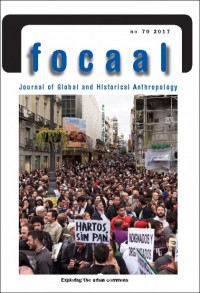Sacrifice zones—abandoned, economically shattered places, with growing social and health problems—are spreading in historically white rural areas and small towns across the United States. Rural decline, rooted in economic restructuring and financialization, exacerbates racial resentment and fosters regressive authoritarian politics.
Category Archives: Blog
David Graeber: Manufactured ignorance: The strange case of Juan Cole and the Kurdish Freedom Movement, and the International Liberal Intelligentsia
 This is a story about how a well-meaning liberal American professor can end up becoming an active propagandist for right-wing forces attempting to destroy a feminist revolution.
This is a story about how a well-meaning liberal American professor can end up becoming an active propagandist for right-wing forces attempting to destroy a feminist revolution.
Heike Becker: “Global 1968” on the African continent
Fifty years after student protests shook much of the Cold War world, in the “West” and in the “East,” “Global 1968” has become the catchphrase to describe these profound generational revolts. West Berlin, Paris, and Berkeley spring to mind prominently, and most memorable behind what was then the Iron Curtain were the events of the Prague Spring. For most commentators and scholars, these events in the Global North appear to have constituted “Global 1968.”
Quinn Slobodian: Against the neoliberalism taboo
Daniel Rodgers has written the latest would-be obituary for neoliberalism as a category of analysis, hot off the press in the first 2018 issue of Dissent magazine. Like Rajesh Venugopal and Bill Dunn before him, he creates a typology of the term’s use before concluding its analytical and political uselessness. Personally, I remain invested in seeking greater precision for the term rather than discarding it. The transformations, competing definitions, and contradictions of a term like liberalism or socialism have not led us to jettison those terms, so why this one?
David Hamou and Ida Susser: Where to Catalonia?: Is this commoning? What for independence?
As we sit here in Barcelona, a historic center of anarchism and left resistance, the questions debated in the most recent Focaal special section “Exploring the urban commons” confront us. As demonstrators take to the streets following the unauthorized referendum for Catalonian independence, many of the people involved are fighting for a new independent state, others are demanding a people’s right to choose, and still others are protesting police brutality and the legacy of Franco represented by the current ruling party. Is this an instance of commoning, or is it an instance of nationalist exclusivity? The dilemma of the relation of nationalism to progressive liberation is an old one, but always historically contingent, and appearing in a new form in this exploration of the commons.
Focaal Volume 2017, Issue 79: Exploring the urban commons
We are pleased to announce that the latest issue of Focaal – Journal of Global and Historical Anthropology has recently published and is available online at its new home, www.berghahnjournals.com/focaal.
Mahmudul H Sumon: An anonymous visit to a garment factory in Bangladesh
After the Tazreen Fashions factory fire (2012) and the Rana Plaza collapse (2013), which killed 119 and 1,136 workers, respectively, the garment sector of Bangladesh has seen the coming of two new regimes of regulatory bodies, namely, “the Accord” (Accord on Fire and Building Safety in Bangladesh) and “the Alliance” (Alliance for Bangladesh Worker Safety). Both bodies are said to be legally binding agreements between global brands/retailers and trade unions designed to build a safe and healthy ready-made garment industry in Bangladesh. Some transnational activists regard these developments as great achievements. In fact, an attempt to have a legally binding document that would hold brands and retailers responsible for their shoddy practices in the global supply chain has been a long-standing demand by some international trade unions, the Clean Clothes Campaign, and other global campaign groups for workers’ rights. The Tazreen factory fire and the Rana Plaza collapse expedited the process.
Jeremy Morris: Cheesed off, but not because of sanctions: Russians adapt to immiseration as global capital increases its grip
With the constant, confusing, and often misinformed media noise around Russia, you would be forgiven for believing a number of unhelpfully distorting half-truths: that Russia has been a pariah state for a while (connected to sanctions after the occupation of Crimea and intervention in East Ukraine); that Russia is on a kind of lockdown with no outlet for protests and careful management of dissent by the state; or that Putin is so popular that protests are pointless or restricted to a small educated minority. Lastly, you might get the impression that oil money continues to keep the Russians reasonably quiescent—after all, the government spent heavily on social programs before and after the initial shocks associated with the global financial crisis.
Nithya Natarajan: Behind the Indian Boom
“Behind the Indian Boom: Inequality and Resistance at the heart of economic growth” is an exhibition curated by Simon Chambers and Alpa Shah.[i] The exhibition draws on research undertaken across India as part of an ESRC- and ERC-funded Programme of Research on Inequality and Poverty based in the Department of Anthropology at LSE led by Alpa Shah and Jens Lerche.[ii] The exhibition also includes contributions from a number of scholars, journalists, and activists.
Axel Rudi: Independence from Whom? The Aftermath of the Kurdish Referendum
In the future, people will say, “On the 16th of October, it happened again.” The Kurds were once again betrayed by the international community. Afraid of losing their territory to the Kurdish self-governance authorities after the independence referendum, the Iraqi state responded with overwhelming military force, compelling the Peshmerga to lay down their arms. In the following days, the Kurdish Regional Government (KRG) lost approximately 40 percent of their territory and withdrew into the pre-ISIS 2003 borders at the behest of the regional powers. The hopes and dreams for Kurdish independence were dashed again, and “the Kurds’ only friends are the mountains.” Shock and disbelief at these recent developments, however, belie a certain naïveté.
